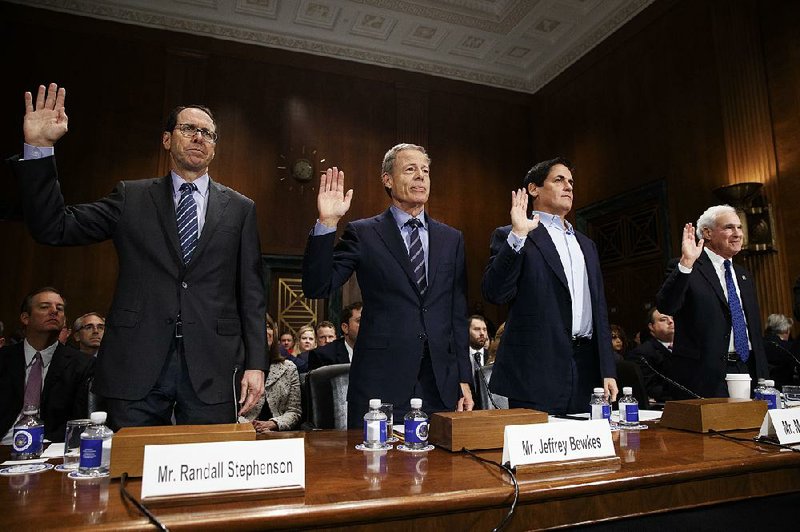WASHINGTON -- When AT&T and Time Warner announced their $85.4 billion deal in October, lawmakers greeted the acquisition frostily. Now their tone has become more encouraging.
At a hearing on Capitol Hill on Wednesday that was being closely watched for how mega-mergers will be viewed in the coming Trump administration, members of a Senate Judiciary subcommittee that oversees regulatory agencies that decide on mergers said the deal merited tough scrutiny.
But in a change from previous comments, they also questioned whether traditional ways of evaluating mergers are growing outdated as Silicon Valley companies such as Facebook and Google become huge media platforms that threaten the television industry.
"We want to ensure that competition thrives in this critical market and we don't stifle innovation or deter the emergence of cutting-edge technologies that customers demand," said Charles E. Grassley, R-Iowa, who heads the full Judiciary Committee. Grassley noted that Google, Facebook, Amazon and Netflix have transformed the video landscape.
Sen. David Perdue, R-Ga., said the deal would combine companies that did not directly compete against each other. "The consumer is benefited from the aggregation," he said. "That is called capitalism."
Larry Downes, a professor at Georgetown's McDonough School of Business, said senators were asking "hard questions." But, he said, "they seem to be open-minded about the changing nature of competition in the information sector."
AT&T, a telecom giant, and Time Warner, which owns CNN and HBO, had said in October that AT&T would buy Time Warner to create a mobile video powerhouse. But the hearing may have implications beyond this deal, with the comments potentially encouraging more acquisitions by companies that have been waiting out the Obama administration, which has rejected several mergers.
Members of Congress do not review mergers, but the hearings provide guidance for antitrust regulators at the Justice Department and the Federal Communications Commission. AT&T and Time Warner have not officially submitted their deal for regulatory review; the review might not include the FCC.
"The DOJ pays particularly close attention to Senate and House antitrust subcommittees because they oversee the DOJ," said Paul Gallant, an analyst at Cowen and Co., who added that the committee's commentary "bears watching for its potential effect on the DOJ." Members of the Justice Department attended the hearing.
When the deal was announced, days before the presidential election, leaders of the Senate Judiciary Committee issued strong cautionary statements about it. Donald Trump, on the campaign trail at the time, said he would block the merger if elected. He has singled out CNN, the cable news network owned by Time Warner, with particular rancor for its election coverage.
As president, Trump will have no direct power over mergers, but he will greatly influence which ones are approved depending on whom he picks to be the assistant attorney general for antitrust or the chairman of the FCC. AT&T's chief executive, Randall Stephenson, told CNBC before the hearing that he had not had contact with the Trump transition team.
During the hearing, the companies pitched a message that catered to the new administration: a populist promise of lower prices and the potential to build more wireless infrastructure through the merger. While AT&T and Time Warner are powerhouses, they presented themselves as weaker rivals to the cable industry and Silicon Valley tech companies.
Stephenson said at the hearing that cable dominated the broadband and television market, serving high-speed internet to eight of 10 American homes. To experiment with new mobile video technologies, he said, AT&T needed to have in-house content to quickly try new streaming services at a lower cost. He added that AT&T had just introduced a streaming service with 100 channels for less than most cable television packages.
"It is only the beginning of what we want to bring to the marketplace to threaten cable's entrenched and still-dominant market position," Stephenson said. He said AT&T would give CNN editorial independence if the merger were approved.
Jeff Bewkes, the chief executive of Time Warner, said "it is not enough to deliver great content." Their competitors have multiplied, he said.
Mark Cuban, an internet entrepreneur and owner of the NBA's Dallas Mavericks, who also spoke at the hearing, said the truly dominant companies in media distribution these days were Facebook, Google, Apple and Amazon.
"Facebook is without question in a dominant position, if not the dominant position, for content delivery," Cuban said.
Consumer groups rejected the characterization of AT&T and Time Warner as disadvantaged rivals, saying a combined company would have too much negotiating power over competitors on licensing rights to Time Warner's networks such as HBO and CNN. Small television networks would also have a harder time getting placed on AT&T's DirecTV satellite and streaming service, they warned.
And streaming providers such as Sling TV and Hulu would face a major new competitor, with AT&T's access to 110 million wireless and satellite subscribers and premium television networks under the same roof.
"Last time I looked, Google and Facebook weren't charging me $200 a month to get those apps," said Gene Kimmelman, president and chief executive of Public Knowledge, a nonprofit consumer group, at the hearing.
"If a single company is able to control so many key inputs to online video, from content production to last-mile transmission, then the competitive promise of this new market could be snuffed out, or at least limited," he said.
Business on 12/08/2016
